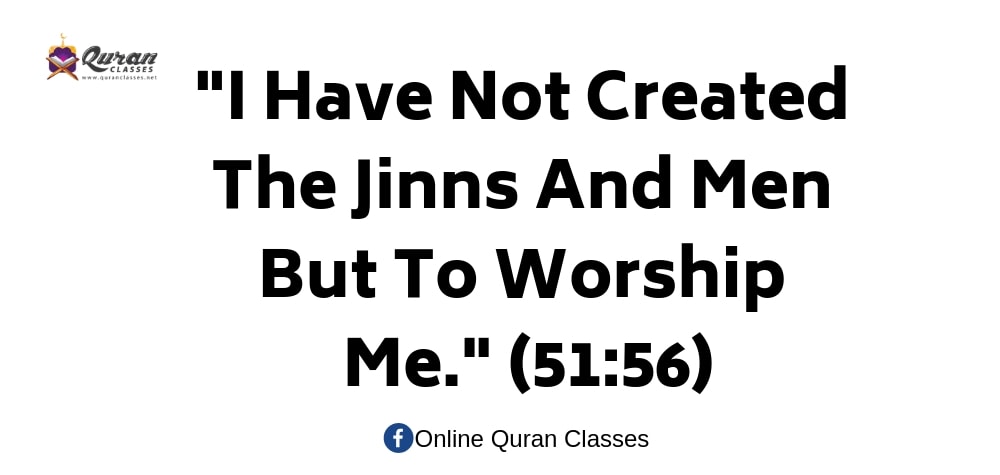The Significance of Last Two Verses of Surah Al Baqarah
January 22, 2019“Forgive whoever Wrongs you.”
January 22, 2019
“I have not created the jinns and men but to worship Me.” (51:56)💙💙
The word Muslim is derived from the same Arabic root as Islaam meaning ‘to submit’. Consequently, the Muslim is the one who submits himself fully to the commands of Allaah (swt); the One true Lord. Allaah (swt) has said in the Qur’an, “I have not created the jinns and men but to worship Me.” (51:56)
In explanation of the above verse, Ibn ul-Qayyim al-Jawziyyah (d. 751 AH) – a student of Ibn Taymiyyah – said:
“The Almighty has informed us that He created them (mankind and jinns) for ‘ibaadah, and He sent upon them His Messengers and Books in order that they submit to Him and obey Him. So ‘ibaadah is the only purpose they were created for.” (Badaa’i at-Tafseer, volume 4, page 248)
Therefore, Allah did not only create us (humans) to pray to Him five times a day, fast in Ramadaan or to perform Hajj at least once in our lifetime; rather, He created us for ‘ibaadah – to say and do what pleases Him. Allah (SWT) says:
“Say: ‘Verily, my salaat (prayer), my sacrifice, my living, and my dying are for Allah, the Lord of the ‘aalameen (mankind, jinns and all that exists).He has no partner. And of this I have been commanded, and I am the first of the Muslims.’” (al-An’aam, 6:162–163)
This aayah (verse) denotes that all our actions should be done for the sake of Allah until death, and even our death should be in His way, for His Deen (religion).
The term ‘ibaadah has also been mentioned concisely in Soorat ul-Bayyinah. Allah (SWT) says:
“And they were commanded not, but li-ya’budullah (that they should worship Allah), sincerely (abstaining from ascribing partners to Him), and perform Salaat and give Zakaat: and that is the right religion.” (98:5)
‘Ibaadah in this verse has a very general and comprehensive meaning, denoting that man was only commanded to serve and obey Allah, and do all actions to attain His Pleasure.
Furthermore, the Messenger (s.a.w) said:
“Islam is built (based) upon five (matters):
(1) ‘Ibaadah of Allah and rejecting anything (worshipped) besides Him,
(2) and the establishment of prayer,
(3) payment of Zakaat,
(4) Pilgrimage to the House and
(5) the fast of Ramadaan.”
(Saheeh Muslim, Kitaab ul-Imaan, Chapter 5, Hadeeth no. 16)
The terms deen, tawheed, ‘ibaadah and taaghout have been hijacked by secularists and the assistants of tawaagheet (apostate rulers) from the shuyookh (scholars) that are paid to twist Sharee’ah terms and justify the presence of taaghout.
It is these same so-called scholars who confine ‘ibaadah (worship) to merely ritual acts done in the masjid or in one’s home. And because of this incorrect understanding of ‘ibaadah that is being propagated by them, it is quite common to see people today who perform lengthy prostrations (sujood) yet they vote for man-made laws, or individuals who fast regularly that deal with ribaa (interest). This is because for these kinds of people, ‘ibaadah means salaat, siyaam, performing Hajj and other ritual acts (only), and not ruling and judging, buying and selling, and so forth.
Allaah (swt) also says,
“Whoever joins other gods with Allaah; Allaah will forbid him the garden, and the Fire will be his abode. There will for the wrong-doers be no one to help.”(19:72)
The purpose of the Muslim therefore is to shun making any partners with Allaah (swt) known as Shirk and to worship Allaah (swt) alone. The secularists and the so called Moderate Mozlom’s and their ilk may argue that Allaah (swt) has created the Muslims for worship and this worship is in prayer, zakaat and hajj, and has no bearing on affairs outside the mosque.
The word Ibadah in Arabic oft-translated as only ‘worship’ however, it is not restricted to this connotation only; but encompasses the following to follow, to obey, to submit to etc. Therefore the Muslim follows the law of Allaah (swt) inside and outside of the mosque; in fact the true Muslim only follows Allaah (swt) alone in all matters; since by doing otherwise one indulges in shirk. Shirk is the association of other gods, demi-gods, people, objects or laws with Allaah (swt) and is the gravest of sins that will not be forgiven since Allaah (swt) has declared,
“Allaah (swt) does not forgive Shirk (making partners with Allaah (swt)) but He (swt) forgives what is less than that to whomever His (swt) wills.” (4:40)
“Al-‘Ibaadah is a term which comprises everything that Allah loves and is pleased with, from the outward and inner sayings and actions.”
Singling out Allah in our worship (Ifraadullahi bil-‘Ibaadah) consists of three pillars:
• Ifraadullahi bin-Nusk – Singling out Allah in ritual acts
• Ifraadullahi bil-Hukmi wat-Tashree’ – Singling out Allah in matters of ruling and legislation
• Ifraadullahi bil-Wilaayah – Singling out Allah in alliance and support
Therefore, ‘ibaadah does not only consist of ritual acts; it is any saying or action (of the heart or limbs) which Allah likes (us to do) and is pleased with. Hence, love, hatred (for the sake of Allah), sincerity, rajaa’ (hope), sabr (perseverance), salaat, siyaam (fasting), Hajj, dhikr (remembrance of Allah), tahaakum (arbitration to Islam), sadaqah (charity), da’wah (inviting people to Islam), commanding good and forbidding evil, ruling by Islam, and all other good deeds are ‘ibaadah (worship).



